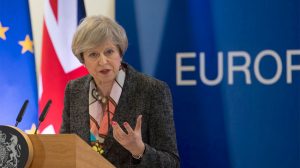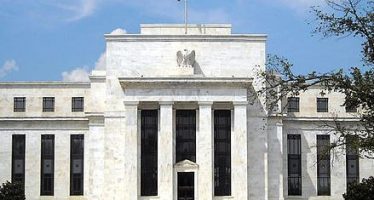Article 50 Invoked: For All the Wrong Reasons

Theresa May. Carl Cour/Getty
Driving a wedge right down the middle of British society and shattering a disconcerting number of endearing stereotypes, Brexit has now been served – fully nine months after a slim majority of voters expressed a wish to leave the European Union. The nation that kept calm and carried on bravely – and victoriously – in the face of overwhelming odds, suddenly seems to have succumbed to angst, nostalgia, mass delusion, and fits of ill-guided resolve to find problems for the solutions proposed.
Whilst there are plenty of good reasons to question the course and wisdom of the European project, the Brexit push uses none of them. Instead, Brexiteers resort to manipulations, machinations, outright lies, false promises, and delusionary vistas of sunny uplands to conduct a wild goose chase: there is no plan or grand strategy – the script is being written as the play is being staged.
Far from calm and carrying on, Brexit Britain prepares for a leap in the dark as bewildered continentals look on and wonder what happened to the nation that made stoicism into an art form – and a guiding principle of its politics and diplomacy, and a model for less enlightened others to aspire to. The British, usually unperturbed by whatever fad obsesses the continent – romanticism, communism, fascism – have now lost their collective cool. Those watching from across the English Channel – or La Manche if the observer happens to be French – wonder where pragmatism and reason have gone as their predictable and appreciated partner embarks on a quest perhaps best described as quixotic.
“Seldom, if ever, was such a crucially important topic – one that would determine the country’s fate for generations to come – presented to voters in such an irresponsible manner.”
The Brexit referendum of June 23, 2016, constituted little more a cunning plan devised by then-Prime Minister David Cameron – the Baldrick of this improbable tale – to kill two birds with a single stone: keep the UK Independence Party in check and extract concessions from his Liberal Democrat coalition partner – the original plot had Mr Cameron withdraw his referendum promise post-election in return for the Lib Dems agreeing to the full Tory agenda. However, the May 7, 2015, general election saw the Conservatives gain an absolute majority in the House of Commons, crushed the Lib Dems, and returned only a single UKIP member of parliament – since deserted. With no need for a coalition partner to strong-arm, Mr Cameron was unable to ditch his referendum promise – the vote had to take place.
Thus, a scenario arose for which nobody in government had prepared. Worse, whilst Prime Minister Cameron reluctantly took the lead of an ill-prepared and disjointed campaign that lacked both a direction and a message, his own Conservative Party suffered a split between leavers and remainers with its hapless leader unable to maintain any semblance of discipline. Meanwhile, Labour – still suffering the aftershocks of its 2015 defeat at the polls and now led by an easily distracted and rather otherworldly ideologue – remained largely absent, leaving the field wide open to assorted crackpots, ego trippers, and opportunists. Seldom, if ever, was such a crucially important topic – one that would determine the country’s fate for generations to come – presented to voters in such an irresponsible manner.
During the lead up to the vote, the Leave Campaign’s wholesale use of fake news, alternative truths, and blatant lies went mostly uncontested. Flyers distributed in the millions spooked voters with warnings that Turkey, Albania, Macedonia, Montenegro, and Serbia were “on the verge” of gaining admission to the European Union resulting in yet more pressure on the underfunded healthcare services. UKIP frontman Nigel Farage found a new nadir publishing his now famous Breaking Point poster depicting hordes of refugees ready to engulf his green and pleasant land.
Leave campaigners assuaged fear by offering assurances that Great Britain would “take back control” whilst keeping full and unfettered access to the cherished single market. Voters happily took the bait: the now infamous £350m per week savings windfall Brexit was supposed to bring. The impressive number, entirely fictitious and the outcome of a likewise impressive exercise in creative bookkeeping, soon gained a life of its own – being spent many times over on the NHS, care for the elderly, infrastructure, defence, and a great many other worthwhile national pursuits.
Within a day after emerging victorious from the vote, prominent leavers such as Nigel Farage dropped the £350m promise: it now appeared to have only been an aspirational savings. Mr Farage et al also had no clue about what was to come next – no master plan, no strategy, no ideas, nothing. It was up to the government, he said, to obey the will of the people and fill in the details.
In the weeks and months following the referendum, most promises and assurances made by the Leave Campaign fell by the wayside: membership of the single market was no longer deemed essential, a hard border around Northern Ireland became a distinct possibility, and the envisioned drop in immigrant numbers suddenly proved a distant and – admittedly – unlikely goal.
In the chaotic aftermath of the vote, Prime Minister David Cameron stepped down and Home Secretary Theresa May, who presided over the largest recorded increase in immigrant numbers ever, floated to the top – by default since her contenders for Number 10 belonged to the looney fringe: spinster-supreme Andrea Leadsom whose love of contorted facts was not limited to her grotesquely inflated CV, and former Mayor of London Boris Johnson, professional EU-basher and originator of countless debunked euro myths, a Churchill wannabe, and the closest thing Great Britain produced to a shock-jock – a man who entertains interlocutors with buffoonery disguised as joviality.
Seizing the moment, Mrs May executed the greatest spin of all, becoming a Brexit convert overnight. Trading her principles for power, Mrs May – a former remainer – allowed her government to be hijacked by the clueless; instead of leading her cabinet and the nation, she was led by those screaming loudest, pulling the entire ensemble towards a hard Brexit – not an option ever presented to the voting public and, in fact, one emphatically rejected by the Leave Campaign. As often happens to converts, Mrs May swiftly radicalised if only to allay lingering suspicions that her heart was not really in Brexit.
The process culminated in Lancaster House where she delivered a blustering Brexit speech on January 17, preposterously warning the European Union of the “calamitous self-harm” it would suffer should Great Britain be denied its every wish and threatening to walk out in case the negotiations failed to deliver a deal considered advantageous. “No deal is better than a bad deal for Britain,” Mrs May fulminated.
As the government plotted an impossible course to allow the country to have and eat its cake, the contradictions mounted. Side-tracked to the Foreign Office, his consolation prize, Boris Johnson promptly departed for Turkey where he lavished praise on locally manufactured washing machines (“I own one!”) before assuring President Erdogan that Great Britain would help his country gain accession to the European Union. Mr Johnson’s greatest accomplishment: keeping a straight face while pledging his country’s support for Turkish EU membership.
As the union creaked at its seams with Scotland rebellious, Northern Ireland fearing troubles, and even placid Wales increasingly concerned, Mr Johnson promised the resurrection of the empire with former dominions and possessions reportedly clamouring to trade with the mother country. Australia indeed proved eager to put British farmers out of business, as did New Zealand. However, India did not quite aspire to become the jewel in Mrs May’s crown. Prime Minister Narendra Modi pointedly reminded Mrs May on her visit to the country that it had been the UK which had blocked a free trade deal with the European Union with its refusal to liberalise the visa regime for Indian visitors to the union.
Meanwhile back home, the government fought tooth and nail – all the way to the Supreme Court – to deny Parliament a say in the Brexit proceedings which, just a few weeks earlier, had been promoted as a way to return power from unaccountable Brussels bureaucrats to the elected representatives of the people. The rabidly anti-EU tabloids suffered a collective fit when the Supreme Court was asked for a ruling with The Sun reminding its readers that one of the judges was “openly gay”, The Daily Mail calling the court an Enemy of the People on its front page, and Nigel Farage – pint in hand – threatening revolution. Public discourse had now reached a new low with dissenters being branded defeatists and traitors, and anyone questioning the wisdom of Brexit summarily dismissed as a fifth-columnist for Brussels or a remoaner.
High on rhetoric and low on plans, Mrs May and her increasingly un-merry band of ministers plod on, making it up as they go along. Asked if he had a plan for the no-deal-scenario as suggested by the prime minister, Brexit Secretary David Davis simple answered: “No”.
Fourteen years ago, the British people were duped – with lies, misinformation, and fake news – into supporting the US-led invasion of Iraq and the toppling of Saddam Hussein. Those few who dared oppose the mission were dismissed as traitors and defeatists. Just as there were no weapons of mass destruction then; there are no sunny uplands now.
Brexit is the product of falsehoods and fabrications. The European Union may be far from perfect – it never pretended otherwise – and offer plenty room for improvement. However, the EU also has many accomplishments to its name apart from delivering “peace in our time”: bringing prosperity (also to the formerly sick man of Europe), maintaining the rule of law, imposing good governance, ensuring a comprehensive set of individual freedoms and protections, and creating the world’s largest market for businesses to prosper in.
Any one of its 28 sovereign member states is free to leave at any time and to remain a good friend and partner to those left behind. However, a friend is not a member of the family and cannot reasonably expect to be treated as one. Herein lies the conundrum facing Mrs May: how to turn one’s back on Europe without being expelled from the family. “We miss you already,” said European Union President Donald Tusk when he received the official notification letter signalling the UK’s intention to exit the EU on March 29. What Europe misses most, however, is the oasis of calm that used to exist in the uplands beyond the White Cliffs of Dover – that most admirable of nations where liberal democracy saw its first light and passion never prevailed over common sense. Those were the days.
You may have an interest in also reading…
Merkel: Convergence in Competitiveness Across the EU
In an address at the 2013 World Economic Forum Annual Meeting, German Chancellor Angela Merkel said that reforms implemented in
“The Entrepreneur” – A Sense of Balance
By Mona Vyas From the moment of conception to the surrender of the last breath, entrepreneurs have to fight innumerable
IMF: The Risk Side of Exceptionally Low Interest Rates
Several years of exceptionally low interest rates and bond buying by some advanced economy central banks have improved some indicators

















































































